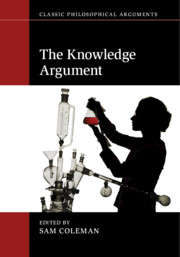Book contents
- The Knowledge Argument
- Classic Philosophical Arguments
- The Knowledge Argument
- Copyright page
- Contents
- Contributors
- Introduction: The Enduring Significance of Jackson’s Knowledge Argument
- 1 The Knowledge Argument Is an Argument about Knowledge
- 2 There’s Nothing about Mary
- 3 Acquaintance, Parsimony, and Epiphenomenalism
- 4 Acquaintance and Phenomenal Concepts
- 5 The Knowledge Argument Meets Representationalism about Colour Experience
- 6 The Mary-Go-Round
- 7 Concept Mastery, Social Externalism, and Mary’s New Knowledge
- 8 Mary’s Powers of Imagination
- 9 The Knowledge Argument Is Either Indefensible or Redundant
- 10 Grounding, Analysis, and Russellian Monism
- 11 Phenomenal Knowledge Why: The Explanatory Knowledge Argument against Physicalism
- 12 The Knowledge Argument and the Self
- 13 What Uninformed Mary Can Teach Us
- Bibliography
- Index
5 - The Knowledge Argument Meets Representationalism about Colour Experience
Published online by Cambridge University Press: 09 September 2019
- The Knowledge Argument
- Classic Philosophical Arguments
- The Knowledge Argument
- Copyright page
- Contents
- Contributors
- Introduction: The Enduring Significance of Jackson’s Knowledge Argument
- 1 The Knowledge Argument Is an Argument about Knowledge
- 2 There’s Nothing about Mary
- 3 Acquaintance, Parsimony, and Epiphenomenalism
- 4 Acquaintance and Phenomenal Concepts
- 5 The Knowledge Argument Meets Representationalism about Colour Experience
- 6 The Mary-Go-Round
- 7 Concept Mastery, Social Externalism, and Mary’s New Knowledge
- 8 Mary’s Powers of Imagination
- 9 The Knowledge Argument Is Either Indefensible or Redundant
- 10 Grounding, Analysis, and Russellian Monism
- 11 Phenomenal Knowledge Why: The Explanatory Knowledge Argument against Physicalism
- 12 The Knowledge Argument and the Self
- 13 What Uninformed Mary Can Teach Us
- Bibliography
- Index
Summary
Mary has new kinds of experiences when she leaves the black and white room. The change is akin to the difference between seeing black and white films and seeing films in colour. That much is common ground in the debate over the knowledge argument. This suggests that an ultimately satisfying reply to the argument on behalf of physicalism should base itself on a plausible view about the nature of the experiences she has for the first time on leaving the black and white room. It is, after all, the nature of these experiences that lies at the heart of the argument’s intuitive appeal. In this chapter, I offer an account of colour experiences and explain how it tells us physicalists what is wrong with the knowledge argument.
- Type
- Chapter
- Information
- The Knowledge Argument , pp. 102 - 117Publisher: Cambridge University PressPrint publication year: 2019
- 2
- Cited by

